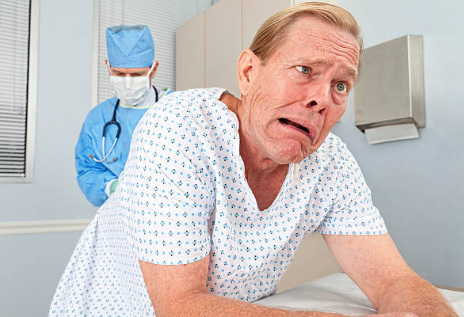Prostate Cancer: Your Worrying Questions Answered
Prostate Cancer: Your Worrying Questions Answered
Let’s talk about prostate cancer. It’s a scary topic, and the thought of it might make you feel overwhelmed. But knowledge is power, so I’m here to guide you through it with clear, compassionate information.
What exactly is prostate cancer?
Prostate cancer is a disease that occurs in a man’s prostate, a gland about the size of a walnut that helps produce semen. In some men, cancer cells in the prostate start growing abnormally and can potentially spread.
What causes prostate cancer?
The exact causes are still being researched, but your risk increases with these factors:
- Age: The likelihood increases significantly after age 50.
- Family History: Your risk is higher if close relatives had it.
- Race: Prostate cancer is more common in Black men for reasons not fully understood.
What about prostate cancer symptoms?
This is tricky. In early stages, there might be no symptoms. Later, you might notice:
- Changes in how you urinate – trouble starting, weak flow, frequent urges especially at night
- Blood in urine or semen
- Discomfort in your pelvic region
- Bone pain if the cancer has spread
Okay, I’ve heard the term ‘prostate cancer stages’. What’s that?
Stages tell you how far cancer has advanced. Here’s a simplified breakdown:
- T2 prostate cancer: Cancer is found within the prostate
- PT3a prostate cancer: Cancer has started to grow beyond the prostate
- Locally advanced prostate cancer: Cancer has spread outside the prostate but is still relatively contained
- Terminal prostate cancer: Cancer has spread significantly to other organs
Will I die from prostate cancer? Is prostate cancer curable?
The outlook for prostate cancer is often very hopeful. Caught early, it’s usually highly treatable. Even some advanced cases respond well to treatment. Don’t assume the worst – talk to your doctor for an individualized assessment.
I’m afraid of prostate cancer treatment side effects
That’s understandable. Typical prostate cancer treatments include:
- Surgery: To remove the prostate
- Radiation: Beams targeting the cancer
- Hormone therapy: To reduce testosterone, which fuels some prostate cancers
- Chemotherapy: Powerful cancer-fighting drugs
- Targeted Drug Therapies: Like prostate cancer drug Xtandi and prostate cancer drug Zytiga
Each treatment has potential side effects. Discuss these openly with your doctor. For example, side effects of hormone treatment for prostate cancer can include hot flashes, fatigue, or sexual problems.
Wait…what’s BPH? Is it different from prostate cancer?
Yes! BPH (benign prostatic hyperplasia) means your prostate is enlarged but it’s NOT cancer. Both BPH and prostate cancer can cause similar urinary symptoms. That’s why checkups are crucial.
So, how do I get tested for prostate cancer?
Usually, it involves a combination of:
- PSA test: A blood test measuring a protein made by the prostate (a high PSA needs further investigation, it doesn’t guarantee cancer)
- Digital rectal exam (DRE): A doctor checks your prostate for abnormalities.
Depending on the results, they may do a biopsy (taking a small sample of prostate tissue).
I’ve heard of people like Ben Stiller and Al Roker having prostate cancer…
Yes, celebrities get prostate cancer too! Their stories highlight how it can affect anyone, and that early detection is key.
What should I do to lower my prostate cancer risk?
While some factors are out of our control, here’s what helps:
- Healthy Diet: Lots of fruits, vegetables, whole grains
- Regular Exercise: Get moving most days of the week
- Healthy Weight: If overweight, talk to your doctor about healthy weight loss
- Talk to Your Doctor: Especially if you have a family history, discuss screening options
I’ve heard conflicting things about supplements for prostate cancer
It’s confusing! Some studies suggest potential benefits from:
- Omega-3 fatty acids and prostate cancer: These may have anti-inflammatory effects.
- Prostate cancer and vitamin D: Some research shows a link between low vitamin D and higher cancer risk.
- Prostate cancer and vitamin E: Studies are mixed, and high doses might be harmful.
5 FAQs based on this article:
FAQ 1: I have no symptoms, do I still need to worry about prostate cancer?
Answer: Yes, especially as you get older. Early prostate cancer often doesn’t cause symptoms. Regular checkups and discussing screening options with your doctor are important, particularly if you have risk factors like family history.
FAQ 2: I’m scared of treatment side effects. Are they always severe?
Answer: It’s natural to be worried! However, side effects vary from person to person. Some men experience only mild effects, while others may have more significant ones. Talking openly with your doctor about specific treatments and their potential side effects is crucial for making informed choices.
FAQ 3: What’s the difference between prostate cancer and BPH?
Answer: Both cause prostate enlargement, but prostate cancer is the growth of malignant cells. BPH is non-cancerous. Similar symptoms mean you’ll need screening to know which condition you’re dealing with.
FAQ 4: Do celebrities really get prostate cancer?
Answer: Yes, prostate cancer doesn’t discriminate based on wealth or fame. Celebrities like Ben Stiller and Al Roker speaking about their experiences helps raise awareness and emphasizes the importance of early detection.
FAQ 5: Are there supplements that actually prevent prostate cancer?
Answer: Unfortunately, there’s no guaranteed supplement for prevention. Some research suggests potential benefits from omega-3 fatty acids, vitamin D, and possibly others, but the evidence isn’t conclusive yet. Always talk to your doctor before starting any supplements, especially if you are considering them for prostate health.

